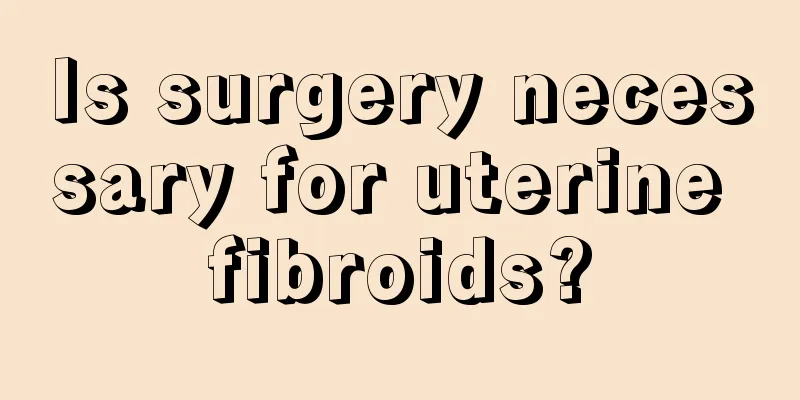Is surgery necessary for uterine fibroids?

|
Uterine fibroids, also known as uterine leiomyoma, are a relatively common benign tumor that may cause symptoms of vaginal bleeding. Many people want to know whether uterine fibroids must be treated surgically, but this is not necessarily the case. Whether surgery is performed is also closely related to the size of the fibroids. 1. Determined by the size of the fibroid It is quite common for women to suffer from uterine fibroids. People with irregular menstruation, endocrine disorders, and overnutrition should hurry up to treat fibroids, because fibroids will continue to grow and then require surgical treatment. Generally, Western medicine recommends observation for fibroids smaller than 5 cm, which is actually a passive wait, waiting for the fibroids to grow and meet the surgical indications before surgical treatment. Surgery includes hysterectomy and fibroid removal. Surgery not only causes great damage to the patient and a long recovery period, but also causes many sequelae, such as abdominal adhesions. More importantly, the chance of recurrence after fibroid removal is very high. More than 70% of patients will develop new fibroids in a short period of time, and the recurrence rate of multiple fibroids is even higher. At present, more than 90% of patients with uterine fibroids do not need surgery. The comprehensive treatment and conditioning of Chinese medicine can well control the growth of fibroids, shrink and eliminate fibroids, improve the estrogen level in the patient's body, and reduce stimulation to the uterus. 2. Fibroid size When uterine fibroids grow to the size of a fist, they cause compression of other organs in the pelvis. Surgical removal can relieve symptoms, but large fibroids are more likely to worsen than small fibroids. Fibroids grow too fast, or after menopause, fibroids do not shrink but grow larger. Uterine fibroids cause heavy bleeding, or long-term excessive menstrual flow and prolonged menstruation leading to anemia, which cannot be cured by medication. At this time, surgical treatment is required. At the same time, under normal circumstances, surgery can be considered if the score is above 6.0, and it is recommended to consider it carefully. 3. Meet the conditions for surgical treatment: Uterine fibroid surgery is to remove the fibroids on the uterus. It is suitable for women who already have children, have larger fibroids with a diameter greater than 5cm, have heavy menstrual periods and are ineffective with conservative medication, or have compression symptoms, submucosal fibroids, or rapidly growing fibroids. |
<<: What are the symptoms of pelvic tuberculosis? Is it easy to detect?
>>: What to do about dysmenorrhea caused by adenomyosis?
Recommend
The reflex area of breast hyperplasia, these knowledge points should be understood
There are certain reflex areas for breast hyperpl...
What are the small granulations in the female urethra?
What is the disease of female urethral granulatio...
How to make breasts bigger naturally?
The development of breasts is an issue that women...
Symptoms of delayed menstrual bleeding
When girls are menstruating, they may not pay att...
Influenza A and Influenza B: similarities and differences between the two brothers
This is the 4739th article of Da Yi Xiao Hu "...
Whether it is morning, noon or evening, as long as you start exercising, you can significantly reduce the risk of Parkinson's disease; sitting for a long time significantly increases the risk of Parkinson's disease
Parkinson's disease (PD) is the second most c...
Do I need to spray my shoes with alcohol after going out? How do I disinfect my shoes after going out?
We all know that the new coronavirus is a relativ...
White spots on the breast
Women's breasts are a part of their body that...
Nutritionist's special reminder! Zibo barbecue is delicious, but you need to follow these 8 points to eat it healthily!
As the weather warms up, the barbecue industry ha...
What is spring tea? Spring tea types and origins
The new teas we are familiar with generally refer...
Can jasmine be repotted in summer? How to prune the newly bought jasmine?
The fragrance of jasmine is refreshing and refres...
Practical transfer! What should I do if I have coughs and pains after turning negative?
If you have questions about the coronavirus Espec...
Ectopic pregnancy bleeding color and treatment
I believe that ectopic pregnancy bleeding is a di...
Itchy white foreign body
Some female friends noticed that their lower body...
Is the residue from medical abortion high echo?
Medical abortion is a method of abortion that mor...









